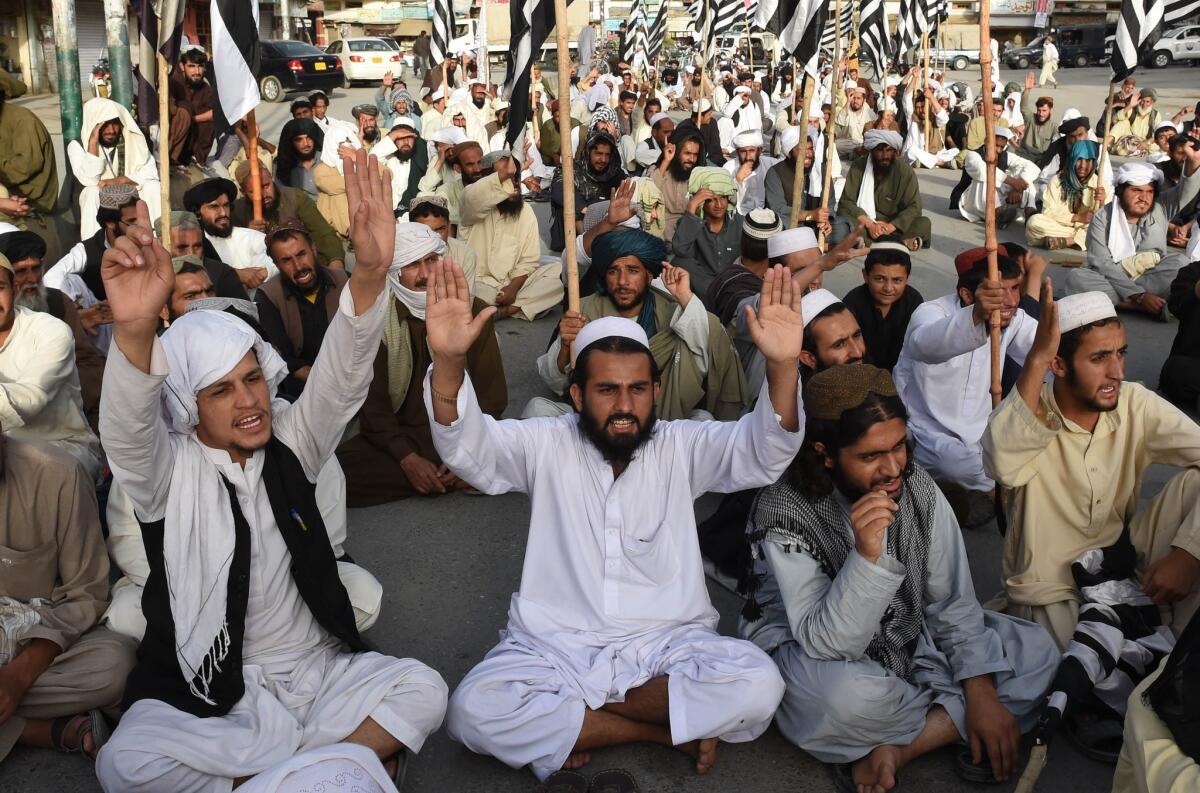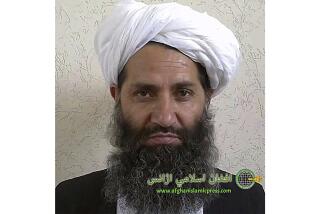Cracks emerge in Taliban leadership in Afghanistan

Pakistani members of the Jamiat Nazriati party pay tribute to Afghanistan’s deceased Taliban chief Mullah Mohammed Omar, in Quetta, Pakistan, on Sunday.
- Share via
Reporting from Kabul, Afghanistan — Signs of a divide in the Taliban emerged Sunday when the apparent brother of former leader Mullah Mohammad Omar said he and others have yet to swear allegiance to the new head of the group.
Mullah Akhtar Mohammad Mansoor was named as the new leader following reports last week that Omar had died in 2013.
In an audio clip sent to local media on Sunday, Mullah Abdul Manan, who identified himself as Omar’s brother, said disagreements among members of the Islamic Emirate, as the group refers to itself, have kept many from swearing allegiance to Mansoor.
“Neither have we sworn allegiance to any one person, nor are we ready to pledge allegiance due to differences. ... We call on all the religious leaders to help resolve the discord rather than supporting or pledging allegiance to anyone,” TOLO TV, the nation’s largest private media outlet, quoted Manan as saying.
The audio recording is the latest example of discord among the nation’s largest armed opposition movement. The death of their leader was confirmed by both the Kabul government and Taliban spokesmen last week.
The Taliban’s official media channels, however, are trying to downplay the reported divisions.
In an online statement, Zabihullah Mujahid, the Taliban spokesman, reported that “thousands of Muslims” across the nation have sworn allegiance to the new leader. According to the statement, leaders in 13 provinces have held allegiance ceremonies in acceptance of the new “leader of the faithful,” as the Taliban head is customarily called.
“Respected scholars, saints, provincial Jihadi leaders, Mujahideen, tribal elders, influential figures and ordinary locals” participated in the ceremonies, the statement said.
The conflicting views said to be held among the ranks of the Taliban have put the Kabul government, which last month held its first-ever face-to-face talks with the group, in a difficult position.
A follow-up meeting planned for last Friday was abruptly canceled after the announcement of Omar’s death.
The presidential palace acknowledged the difficulties but said it would continue to carefully monitor all opposition movements in the country.
“The groups which are engaged in war against their people and country must understand that they have been deceived by the conspiracies of the enemies of Afghanistan,” the palace statement read, in part.
The reference to enemy conspiracy is believed to be an allusion to the long-held Afghan belief that neighboring countries, particularly Pakistan, are aiding and abetting the armed opposition.
Aimal Faizi, who had served as spokesman to former President Hamid Karzai, agreed.
He said the status of the Taliban leadership is of little consequence because decisions are made by others.
Mullah Omar, said Faizi, “did not really matter for the U.S. in its war on terror. They knew about his whereabouts in Pakistan.”
The official confirmation of Omar’s death issued by the Afghan government said he died in a hospital near the Pakistani port city of Karachi.
Around the time of his reported death, Faizi said senior officials in the Quetta Shura, the Taliban’s chief decision-making body, informed Karzai that “they have not seen Mullah Omar for the last 10 years.”
Latifi is a special correspondent.
More to Read
Sign up for Essential California
The most important California stories and recommendations in your inbox every morning.
You may occasionally receive promotional content from the Los Angeles Times.













